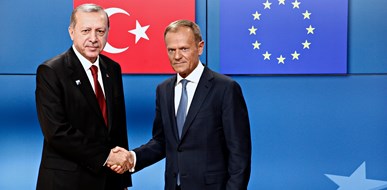Pros and cons of EU cooperation on migration
Published 22 November 2018
The Readmission Agreements (RAs) between the EU and third countries formalise standards and procedures on the return of irregular migrants to their countries of origin or transit. However, the EU has not been able to convince many third countries to conclude readmission agreements. © Shutterstock.
Asser expert Dr Narin Idriz gave a presentation on EU and third countries’ cooperation on migration at the Renforce conference at the University of Utrecht last week. She discussed the pros and cons of the EU’s current strategies to manage migration flows, a top priority for the EU as the refugee “crisis” of 2015-16 brought the cooperation within the EU to a deadlock.
Dr Idriz’ presentation focused on ‘the building block of EU migration management’, the so-called Readmission Agreements (RAs) with third countries. These agreements formalise standards and procedures on the return of irregular migrants to their countries of origin or transit. However, the EU has not been able to convince many third countries to conclude readmission agreements. The carrot of visa facilitation for short stays in return for signing RAs was not attractive enough beyond the candidate states for EU membership and EU’s neighbours to the East.
New strategies What makes these agreements unattractive for third countries is the fact that they impose an obligation to re-admit both their own nationals and people from other countries (‘third country nationals’) who have crossed their territory on their way to the EU and reside there illegally. Dr Idriz: “So, to persuade other states to engage in a dialogue on migration management and return, the EU had to come up with new strategies. Economic assistance and the creation of possible paths of legal migrations have been part of that strategy.” When concluding formal RAs was not a possibility anymore, the EU and its members states have attempted to achieve the same result by using non-legally binding informal arrangements.
What makes these agreements unattractive for third countries is the fact that they impose an obligation to re-admit both their own nationals and people from other countries (‘third country nationals’) who have crossed their territory on their way to the EU and reside there illegally. Dr Idriz: “So, to persuade other states to engage in a dialogue on migration management and return, the EU had to come up with new strategies. Economic assistance and the creation of possible paths of legal migrations have been part of that strategy.” When concluding formal RAs was not a possibility anymore, the EU and its members states have attempted to achieve the same result by using non-legally binding informal arrangements.
Informal arrangements
These ‘informal arrangements’ come in many different forms, such as joint communiqués, Memoranda of Understandings, Joint Ways Forward, etc... Examples are arrangements with Mali, Afghanistan and the EU-Turkey deal of March 2016. According to the EU-Turkey deal, which came in the form of a statement and press release, all new irregular migrants and asylum seekers arriving from Turkey to the Greek islands (and whose applications for asylum have been declared inadmissible) would be returned to Turkey. The carrot for Turkey was the promise of visa liberalisation for its citizens, upgrading of the customs union with the EU, and financial assistance of six billion euros.
Sidestepping rules of procedure
Dr Idriz: “The biggest challenge for individuals that are affected by these soft law instruments is that they deprive them of judicial protection and expose them to human rights violations. From an institutional perspective, these flexible arrangements are also problematic, as they sidestep established rules of procedure. They bypass the involvement of the institutions that provide democratic legitimacy to the decision-making process, such as the European Parliament.”
At the conference, Dr Narin Idriz discussed the benefits, shortcomings and the evolution of the readmission agreements into more informal arrangements such as the EU-Turkey deal.
Further reading
For more research publications on this topic by Dr Idriz click here.
Dr Idriz is part of the Asser research strand Human Dignity and Human Security in International and European Law. This research strand adopts a human rights approach to global challenges in the field of counter-terrorism, international criminal law, international humanitarian law, international trade, environmental protection, European private international law, and the law of EU external relations. It examines what it means to safeguard human dignity - also in relation to human security - in these areas.
